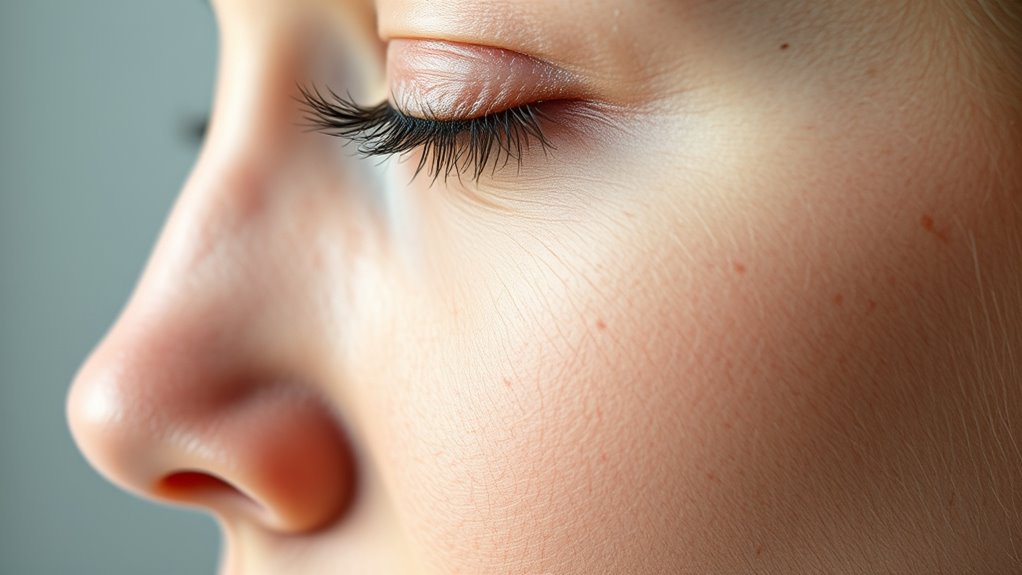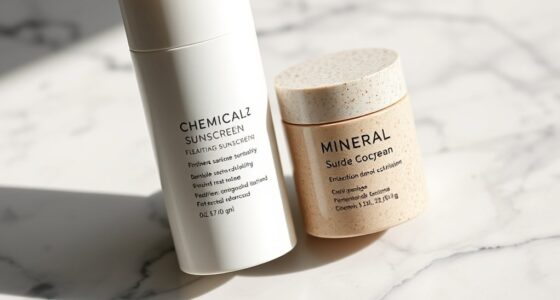Skin experts avoid using physical exfoliators on delicate areas like your eyes, lips, and nose because their thin, fragile skin can easily suffer microtears, irritation, or long-term damage from abrasive particles. These zones support less collagen and are more prone to redness, inflammation, and signs of aging. Using harsh scrubs can worsen these issues and weaken your skin’s barrier. To protect your skin’s health and appearance, it’s best to choose gentle alternatives—more details will show you how.
Key Takeaways
- The thin, fragile skin around eyes, lips, and nose is more prone to microtears and damage from abrasive physical scrubs.
- Harsh exfoliants can weaken the skin barrier, leading to irritation, redness, and increased sensitivity in delicate areas.
- Mechanical exfoliation risks causing broken capillaries, hyperpigmentation, and accelerated aging in sensitive facial regions.
- Gentle exfoliation methods, such as enzymatic or chemical options, are preferred to minimize micro-injuries in vulnerable skin zones.
- Proper monitoring and gentle care prevent long-term damage, maintaining skin health and youthful appearance in sensitive areas.
The Skin’s Thinness and Sensitivity in Delicate Areas
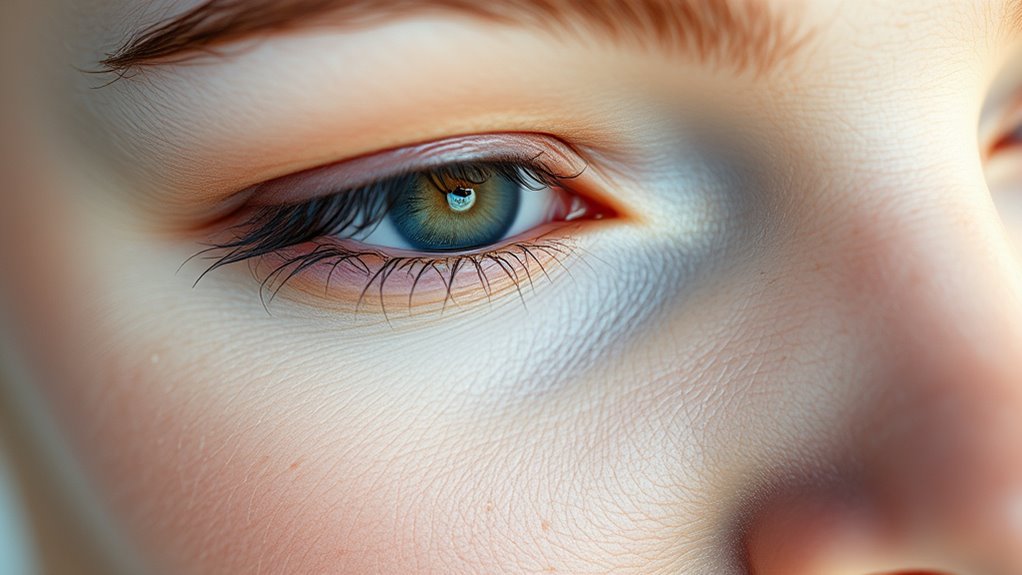
Because the skin in delicate areas like around your eyes, lips, and the corners of your nose is much thinner and more fragile, it’s especially vulnerable to damage from physical exfoliants. These sensitive areas have thinner skin, making them more prone to irritation and micro-tears when abrasive scrubs are used. Physical exfoliants can disrupt the skin barrier, which is already delicate in these zones, leading to increased redness and inflammation. Since the lips lack a stratum corneum, they’re even more susceptible to dryness and irritation from harsh scrubs. The eyelids contain fewer oil glands and are fragile, heightening the risk of damage. Overall, using physical exfoliants on these areas can cause lasting harm, compromising skin health and leading to long-term sensitivity. Additionally, specialized exfoliation methods are recommended for these delicate zones to minimize the risk of injury and maintain skin integrity. Understanding skin anatomy helps clarify why these areas require gentle care to preserve their health and function. Moreover, choosing gentle skincare routines over aggressive treatments is essential to protect these sensitive regions. Furthermore, skin barrier health is crucial in maintaining resilience against external aggressors, and proper care can help prevent damage. The increased sensitivity in these regions can be exacerbated by automation in business, which emphasizes the importance of tailored, gentle skincare routines over aggressive treatments.
Risks of Microtears and Irritation in Fragile Regions
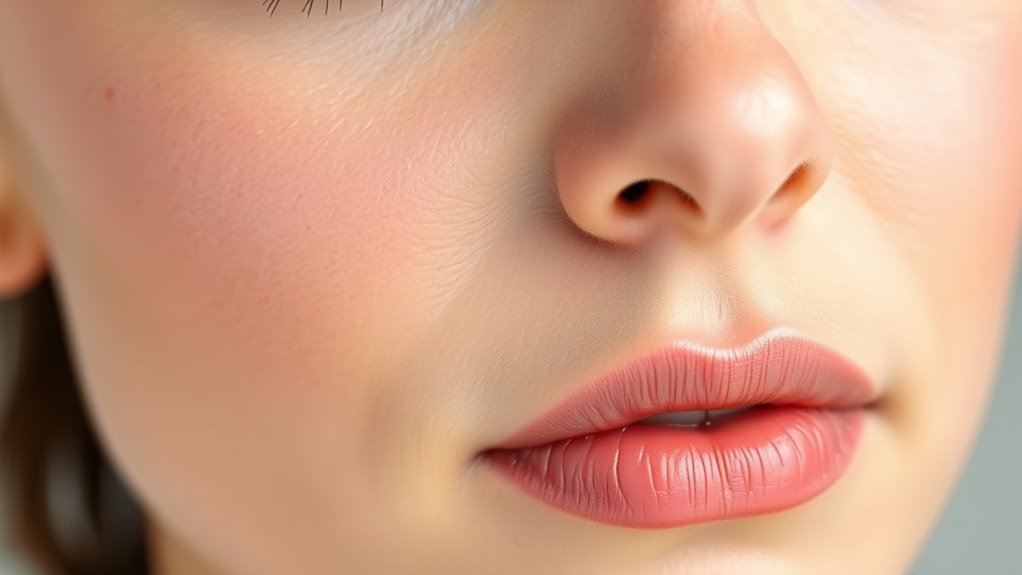
The delicate skin around your eyes and lips is especially vulnerable to microtears caused by abrasive physical exfoliants. These microtears compromise your skin barrier, increasing irritation and redness. Microdamage allows bacteria and pollutants to enter sensitive regions, heightening infection risks. Using harsh scrubs on fragile areas can worsen existing conditions like rosacea or eczema.
| Sensitive Regions | Risks of Physical Exfoliants |
|---|---|
| Under the eyes | Microtears, irritation, increased microdamage |
| Lips area | Redness, compromised skin barrier |
| Cheeks | Heightened sensitivity, microdamage |
| Around nostrils | Infection risk, microtears |
Avoid physical exfoliants here to prevent irritation and protect your skin’s health.
The Danger of Over-Exfoliation Near Eyes and Lips
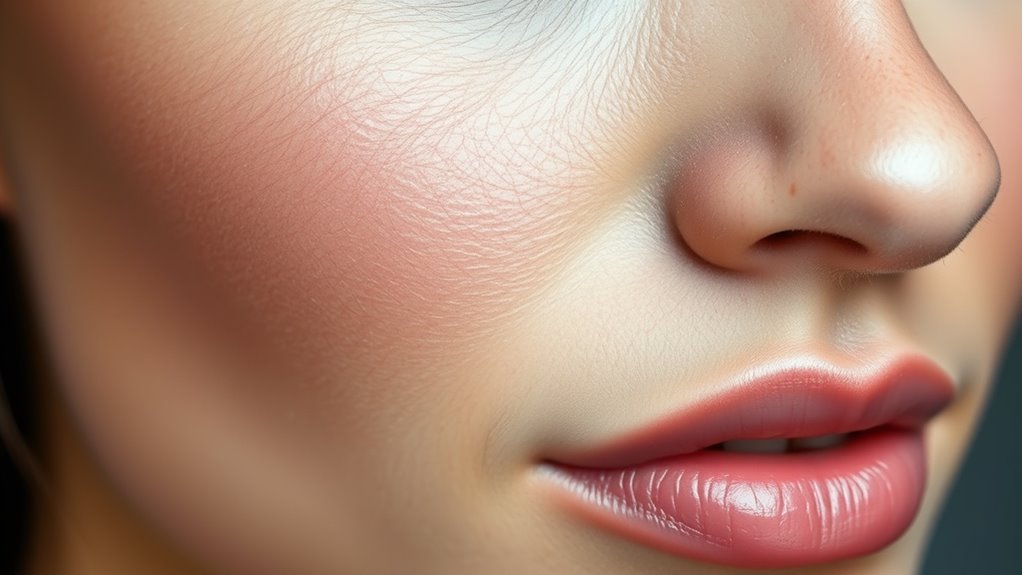
Since the skin around your eyes and lips is much thinner and more delicate, it’s especially prone to damage from over-exfoliation. Using harsh scrubs or frequent exfoliants can cause irritation, micro-tears, and even long-term issues like wrinkles. To protect these areas, stick with gentle methods and avoid aggressive scrubbing. Additionally, understanding the importance of climate control can help you choose skincare products with formulations that maintain natural skin tones without causing unnecessary irritation. Maintaining proper skin barrier health is essential to prevent over-exfoliation from compromising the skin’s protective layer. Incorporating advanced skincare technologies can further support skin resilience in sensitive areas and prevent damage.
Thin Skin Vulnerability
Did you know that the skin around your eyes and lips is much thinner and more delicate than other facial areas? This thin skin makes these sensitive areas highly vulnerable to damage from physical exfoliants. Using abrasives or harsh scrubs can cause micro-tears and compromise the skin barrier, leading to irritation and long-term damage. Because the skin here lacks robust collagen and elastin support, trauma from physical exfoliants accelerates signs of aging like fine lines and sagging. Additionally, with fewer oil glands and slower regeneration, these delicate skin regions are prone to prolonged redness, dryness, and sensitivity when over-exfoliated. Experts advise avoiding physical exfoliants in these zones altogether, favoring gentle chemical options or skipping exfoliation to protect this vulnerable thin skin. Understanding skin vulnerability underscores the importance of choosing gentle skincare methods for these areas. Moreover, skin elasticity diminishes with age, making proper care even more critical in maintaining a youthful appearance. Recent research into skin regeneration suggests that overly aggressive exfoliation can hinder the natural healing process of these sensitive areas, emphasizing the need for cautious skincare. Additionally, cybersecurity vulnerabilities highlight how neglecting proper care can leave these skin areas exposed to potential damage, similar to how weak security measures can compromise digital assets. Maintaining proper skincare routines tailored for delicate skin is essential to prevent long-term damage and preserve skin health.
Increased Irritation Risks
Exfoliating too aggressively near your eyes and lips can quickly lead to irritation and damage because these areas have delicate skin that’s much thinner and more sensitive. Physical exfoliants with jagged particles can easily cause micro-tears and micro-abrasions, which heighten inflammation and discomfort. Over-exfoliation compromises the skin barrier, making your skin more vulnerable to dryness, redness, and reactions to irritants. The constant movement and flexing of the lips and eye area amplify the mechanical stress from physical scrubs, increasing the risk of injury. Because of their increased sensitivity and fragile structure, these zones are prone to irritation and long-term damage if improperly exfoliated. Understanding skin anatomy helps explain why these regions require gentler treatment to protect their integrity. Employing appropriate exfoliation techniques can prevent unnecessary harm and preserve skin health in these sensitive areas. Additionally, regular skin assessments can help identify early signs of irritation, allowing for prompt adjustments in skincare routines to maintain optimal skin condition. Incorporating gentle skincare practices is essential for maintaining the health of these sensitive areas and avoiding unnecessary harm.
How Abrasive Particles Can Damage Thinner Skin Layers
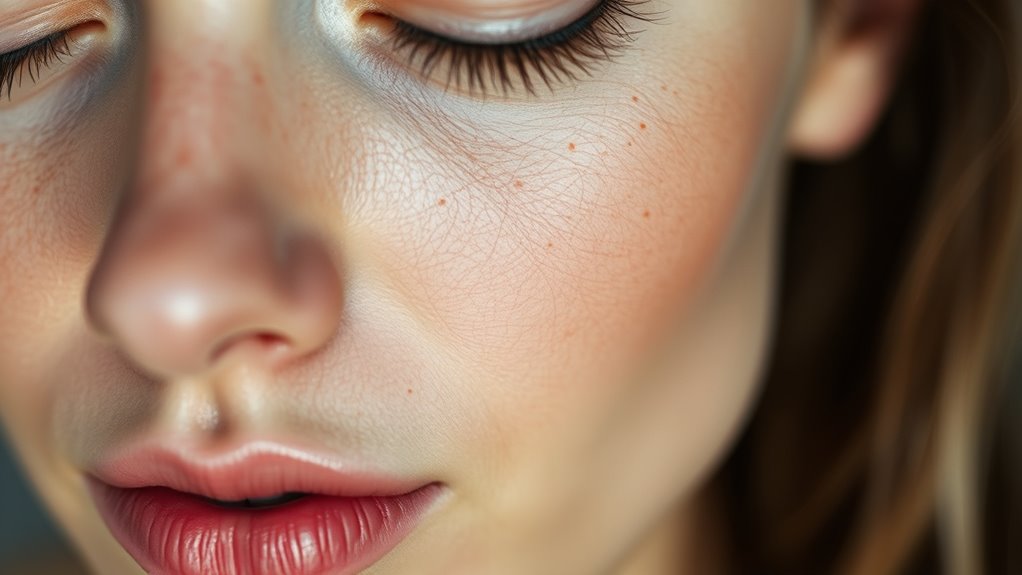
Abrasive particles in facial scrubs can cause significant damage to the thinner skin around delicate areas like the eyes and lips. These harsh particles, such as walnut shells or apricot kernels, create micro-tears and micro-scratches that weaken the skin barrier. Since thinner skin has fewer cells and less collagen, it’s less resilient to physical trauma, making it more prone to damage. The micro-tears not only compromise the skin’s natural defenses but also lead to increased irritation, redness, and a higher risk of infections. Using abrasive particles on these sensitive zones accelerates damage rather than prevents it. To protect your delicate areas, opt for gentle exfoliants designed to avoid micro-injury and maintain the skin’s integrity over time. Home improvement principles, like creating designated zones and utilizing gentle tools, can serve as helpful metaphors for maintaining the health and organization of your skin. Additionally, understanding resources and tools available for skincare can help you choose safer exfoliation options.
The Role of Gentle Alternatives in Sensitive Zones
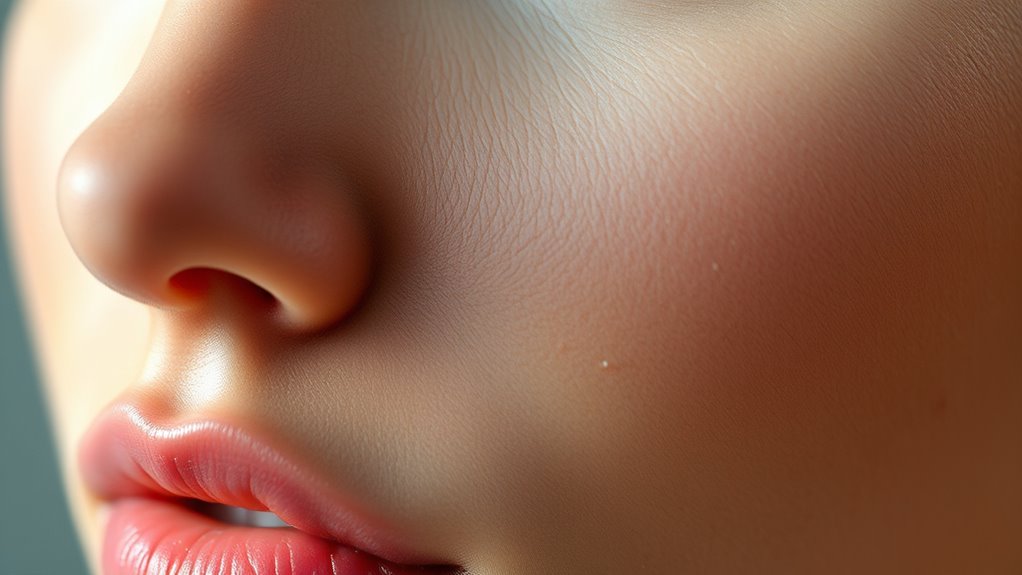
Since the skin around your eyes and lips is thinner and more delicate, using harsh physical scrubs can do more harm than good. Gentle alternatives are essential to protect sensitive skin and maintain your skin barrier. These options include:
Gentle skincare is key for delicate eye and lip areas to prevent damage and irritation.
- Soft washcloths that gently lift away dead skin
- Enzymatic cleansers that dissolve debris without abrasion
- Chemical exfoliants with soothing ingredients like lactic acid
- Serums with niacinamide to reduce inflammation
- Avoiding jagged particles that cause micro-tears and irritation
Signs of Damage From Physical Exfoliants in Vulnerable Areas
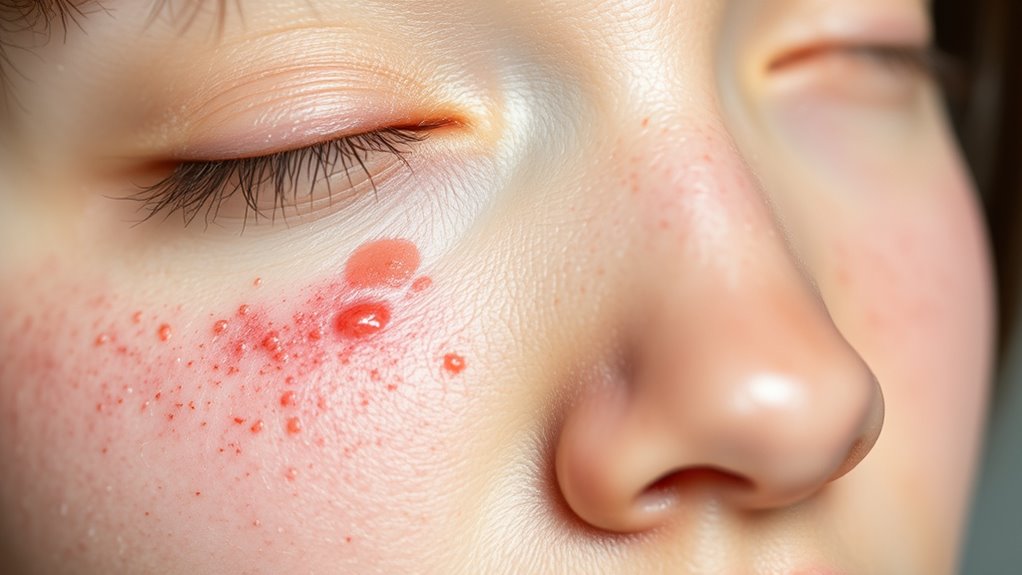
The delicate skin in vulnerable areas like around the eyes, lips, and nose can show clear signs of damage when exposed to physical exfoliants. Micro-tears from abrasive particles weaken the skin barrier, leading to irritation and persistent redness. You might notice increased fine lines, especially around the eyes, or new hyperpigmentation in areas with broken capillaries. Areas with thin or sensitive skin are prone to micro-injuries that cause dryness and irritation. Repeated use of coarse scrubs accelerates skin aging by damaging collagen and elastin fibers.
| Damage Signs | Affected Areas | Consequences |
|---|---|---|
| Micro-tears | Around eyes, cheeks | Increased fine lines |
| Persistent redness | Nose, broken capillaries | Inflammation, irritation |
| Hyperpigmentation | Acne scars, active breakouts | Uneven skin tone |
Best Practices for Maintaining Skin Health in Sensitive Facial Regions

To keep your sensitive facial areas healthy, focus on using gentle techniques that minimize irritation. Make sure to keep these regions well-hydrated and support your skin’s barrier with calming products. Regularly monitor your skin for signs of redness or discomfort to adjust your care routine accordingly.
Gentle Technique Emphasis
When exfoliating delicate areas like around the eyes and lips, adopting a gentle technique is essential to protect your skin. You want to minimize the risk of micro-tears and irritation by using soft tools and light pressure. Focus on upward motions to avoid pulling or stretching sensitive skin. Choose smooth, biodegradable powders or soft silicone brushes that won’t scratch or abrade. Remember, heavy pressure or jagged particles can damage the skin barrier, causing redness and inflammation. Consistency is key—controlled, gentle movements deliver effective exfoliation without crossing into irritation. Visualize yourself gently gliding these tools over your skin, avoiding harsh scrubbing. Prioritizing a gentle technique ensures your delicate areas stay healthy, resilient, and free from long-term damage.
Hydration and Barrier Support
Maintaining proper hydration and supporting your skin’s barrier are essential steps in keeping delicate facial areas healthy, especially after gentle exfoliation. Hydration with humectants like hyaluronic acid helps lock in moisture, protecting the skin barrier from becoming compromised. Supporting your barrier with barrier-repair ingredients such as ceramides and omega fatty acids strengthens resilience against micro-tears and mechanical stress from physical exfoliants. Sensitive skin is more prone to barrier disruption, redness, and inflammation when over-exfoliated. To prevent this, avoid aggressive physical scrubs in these areas and focus on gentle exfoliation methods. Consistent barrier repair routines and adequate hydration preserve your skin’s barrier function, reducing irritation and ensuring your delicate facial regions remain healthy and resilient.
Sensitive Skin Monitoring
Monitoring your skin’s response in sensitive areas is essential for preventing damage and maintaining health. Sensitive skin around delicate areas like the eyes and mouth is prone to irritation and micro-tears from physical exfoliants. Regular monitoring helps you catch early signs of trouble, such as redness, tightness, or burning. Be attentive to how your skin reacts after applying products, especially gentle exfoliants or serums. Look for:
- Increased redness or flushing
- Unusual tightness or dryness
- Burning sensations
- Swelling or puffiness
- Persistent irritation
If you notice any of these signs, stop exfoliating and switch to soothing, hydrating treatments. Proper monitoring ensures you protect delicate areas, avoid micro-tears, and support healthy skin response without aggravating sensitive skin.
Frequently Asked Questions
Is It Bad to Use a Physical Exfoliant on Face?
Using a physical exfoliant on your face isn’t always bad, but it depends on your skin type and the area you’re targeting. If you have sensitive or acne-prone skin, it can cause irritation, micro-tears, or even worsen breakouts. Be careful with harsh scrubs, and opt for gentler chemical exfoliants or soft cleansing methods instead. Always listen to your skin’s response to avoid damage and keep your complexion healthy.
Do Dermatologists Recommend Exfoliating the Face?
You might wonder if dermatologists recommend exfoliating your face. They generally do, but prefer gentle chemical exfoliants over physical scrubs. This is because chemical options effectively remove dead skin cells without causing irritation or micro-tears, especially in sensitive areas. By choosing these, you reduce the risk of inflammation and damage, leading to healthier, clearer skin. Always follow a dermatologist’s advice to find the best exfoliation method for your skin type.
Why Shouldn’t You Exfoliate Your Face?
You shouldn’t exfoliate your face? Well, unless you’re into micro-tears, inflammation, and breakouts, then go ahead! Physical scrubs can damage delicate spots like your cheeks, around your eyes, and near your nose, making your skin more vulnerable. Instead, opt for gentle chemical exfoliants—they do the job without turning your face into a battlefield. Protect your skin barrier and save the rough stuff for your driveway.
Does Physical Exfoliation Damage the Skin Barrier?
Physical exfoliation can damage your skin barrier because the coarse particles create micro-tears, especially on delicate areas like around your eyes and lips. This disruption weakens the protective lipid layer, leading to increased dryness, redness, and sensitivity. Over time, it can make your skin more vulnerable to irritation and environmental toxins. That’s why experts advise against using physical scrubs on sensitive or thin skin areas to maintain your skin’s health.
Conclusion
Remember, your delicate eye and lip areas are 40% thinner than the rest of your skin, making them more prone to damage. Using harsh physical exfoliants can cause microtears, irritation, and long-term harm. Instead, opt for gentle chemical exfoliants or soothing treatments. Protect these sensitive zones to maintain their health and youthful appearance. Trust me, taking care in these areas is worth it—your skin will thank you, and you’ll reduce the risk of premature aging and irritation.
